-
Japanese Wooden Weapons Craftsmanship, the Beginning of the End | In addition to the structural crisis affecting the industry, in 2019, the closure of one of the largest Japanese workshops, Horinouchi, then, in 2020, the covid crisis have for consequences a drastic increase in prices and production times, and mid-term, a probable disappearance of the manufacture of wooden weapons in Japan. To learn more, you can read our article detailing the situation and the measures taken to help this industry. -
Review Reward Campaign | Leave a comment on your recent purchase and receive a 5% discount.
Presentation of the Artisans: Traditional Japanese Workshops
Seido’s Choice of Traditional Craftsmen
We have a special relationship with most of our suppliers and artisans, and we consider it important that you know the humans behind your equipment. Here is a presentation of all the workshops we are working with. We have a few blog articles about these workshops, and we will continue working on presenting all of them, so stay tuned, and bookmark The Seido Blog.
Contents
Aikidogi
All our Aikidogi are made in Japan, - almost 100% made in Japan. Unfortunately, the amount of cotton produced in Japan is small and, therefore, has to be imported from South Asia. However, the weaving, cutting, sewing and bleaching processes are executed in Japan. We call that “100% made in Japan” when referring to our Aikidogi, contrary to the “Made in Japan” statement of other brands and industries. In the latter case, it usually only means “one significant step” of the fabrication process is made in Japan.
The Aichi Workshop
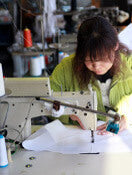
Models : AS200, AS250, WA300, WA600, KS200, Karategi, Iaidogi & Kendogi, and Soft Belts.
Located in the countryside, the Aichi Workshop is the biggest workshop in the Aichi region. Founded almost a century ago, it supplies some of the most famous brands in Japan. What made the Aichi workshop so famous is the outstanding quality of the cotton fabric. Aichi was one of the first cotton producers in Japan, renowned in the whole country. Today, the local production is so small it is limited to very expensive items and towels. However, the artisanal knowledge is still in this region, a region that was and is one of the most dynamic in the sewing/garment production.
KuSakura - Osaka
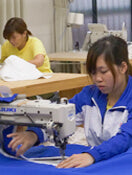
KuSakura, inventor of the modern Judogi, is the only manufacturer controlling the entire production chain from fabric weaving to quality control of the finished item.
KuSakura is the number one company of the industry, and, to our eyes, the most ethical of all, which is why our partnership with them has been so successful over the years. They no only provide a guaranteed fast production without compromising on a high quality finish, but also an incredible support to their own craftsmen.
Seido is the only brand for which KuSakura produces OEM products.
Hakama
Alike our Dogi, our Hakama are 100% made in Japan; only some of the raw materials must be imported. Fabric weaving, cutting, sewing and dyeing - are processes entirely executed within Japan.
The Nara Workshop

Model: Keiko Tetron Hakama.
This small workshop, renowned for its high-quality Kendo and Iaido Hakama, is in one of the most beautiful villages in Japan. Although this atelier tried to bring an Aikido Hakama on the market, the result was not convincing. Together, we entirely redesigned the Aikido Hakama and came up with the model we offer today: Using a solid, reliable, but classic, Tetron fabric, focusing on reinforcements and an adapted back plate part. We could create a good Aikido Hakama, that convices as the most durable and robust product available.
The Ueno Workshop (Tokyo)
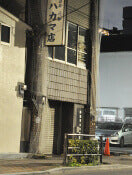
Models: all traditional models (except the Keiko Tetron Aikido Hakama).
Undoubtedly, the oldest workshop in Japan for hand-sewn Hakama, with a century old history. Supplier for many famous brands, it produced Kendo, Iaido, Kyudo, Sado, and Aikido Hakama. As far as we know, it is the last workshop fabricating hand-sewn Aikido Hakama. Due to the cost of the production process and the high level of skills required, it is very unlikely that any other workshop could duplicate their Hakama: The workshop set the standards for the first Aikido Hakama with the company Iwata, with which we are acquainted.
Obi (belt)
The belt production process is simple, yet requires extensive skills to obtain clean stitches and sewing lines. Belts with an integrated embroidery are, however, far more complicated to manufacture as it requires a great amount of finesse to center the embroidery perfectly, while stitching the belt. All models are 100% made in Japan.
The Osaka Workshop
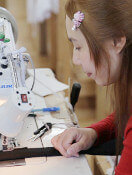
Models : Slim, Slim Reinforced, Shushi and Silk.
This large workshop in Osaka’s suburb has been making belts for almost a century. Modern, clean, and well-equipped, it is one of the most “high tech” ateliers we are working with. We have collaborated with many belt makers in the past, but for integrated embroideries, this workshop definitely raised the bar. The skills of the artisans to center an integrated embroidery are probably unmatched. “Westerners” name embroideries can, sometimes, be a little confusing for Japanese artisans; some letters do not exist in the embroidery font, but the workshop always does its best to fulfill our customer’s desires.
Wooden Weapons & Bags
Because the products of each workshop are insufficient in terms of quantity, we are working simultaneously with the remaining 4 workshops for wooden weapons. They are in Miyakonojo, a small city in the middle of nowhere in Kyushu, close to one of the most beautiful forests in Japan, the Kirishima Sankei.
Nidome’s Workshop
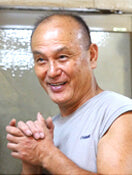
Run by two brothers, it is the smallest of the four workshops. Nidome’s older brother is the most skillful craftsman we have met so far in Japan. All too humble, Nidome is a very friendly and adorable old man, with amazing expertise. Unfortunately, his work for the Japanese army consumes most of his time, and we barely receive a few dozen weapons per month. Obviously, we want him to do those that require the highest competence: Sunuke, Tsubaki, and custom made white oak Bokken.
Read more about Nidome’s workshop on our blog : History of the Japanese Bokken & interview with master Nidome Yoshiaki
Aramakis Workshop
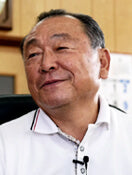
Master Aramaki is, as master Nidome, famous for his highly skilled work. Awarded with the emperor's “Blue Ribbon Medal”, Aramaki is the biggest workshop, with more than a dozen artisans. Aramaki’s workshop is also the last one still working Hon Kokutan (African Ebony) and Hon Biwa (Japanese loquat) for collection pieces and offering high quality Sunuke and Camellia weapons. About half of Seido’s weapons come from Aramaki’s workshop.
Read more about Aramaki's workshop on our blog : Handmade Bokken, Jo, Tanto, …: At the workshop Aramaki Bokuto Mokojo
Horinouchi’s Workshop
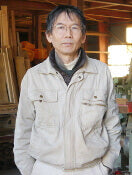
Horinouchi’s workshop was about the same size as Aramaki’s. Horinouchi had the widest catalog and great knowledge of all types of weapons. Because it held the biggest production capacity, his closing in September 2019 completely shook up the industry and the community.
Seido has managed to transfer most of Horinouchi's knowledge to the other workshops.
Read more about Horinouchi on our blog: Different Types and Shapes of Japanese Wooden Swords : A visit at the Horinouchi workshop
We are keeping this workshop listed here for a while, by respect for the craftsmen.
Matsuzaki’s Workshop

Matsuzaki is a small workshop with only a few artisans. Supplier of some of the most famous Japanese brands, such as KuSakura, Matsuzaki is more focused on “standard” weapons made from, e.g., red or white oak. Matsuzaki’s son is now working in the workshop and will take over in a few years; like most of our suppliers, this atelier is a family business.
Nagoya's Workshop

There are only a few, 3 or 4, weapon bag workshops left in Japan. Most practitioners are not willing to provide the means required to buy “made in Japan”, just for a bag, and therefore, this industry suffered a lot during the past few years. Mr. Hashizume, who runs this atelier, shares our ethics and high-quality standards. Before we started working with him, there was not a single company in Japan producing carry bags, especially made for Aikido weapons. At Seido, as an Aikido equipment specialist, we put a lot of effort into these products to fill the void that existed. Thanks to Mr. Hashizume, we were able, together, to create multiple models with different characteristics that cover the needs of most Aikidoists. All that, while keeping our “100% made in Japan” standards at the highest.
Iaito
Minosaka Workshop
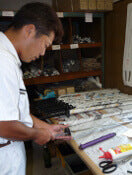
Minosaka is one of the very few Iaito workshops in Japan and despite its small size, it is famous in and outside Japan. Only a few artisans work there; about 20 pieces are produced a day, and there isa lot of attention to detail. Most of the Kanagu (pieces) used are oxidized to give it an ancient look, and the finish of the blade (Yokote line) is outstanding… Minosaka’s staff is also very friendly, always ready to answer request we have to fulfill our customer’s desires.
Read more about Minosaka on our blog : The origin and manufacture of the Iaito, replica of the Japanese sword, the Katana : Visits to the Minosaka Workshop.